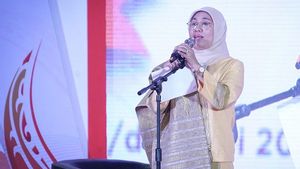JAKARTA - The Financial Services Authority (OJK) and the Central Statistics Agency (BPS) announced the results of the 2024 National Literacy and Financial Inclusion Survey (SNLIK). As a result, Generation Z or called Gen Z is less financially literate.
Chief Executive of the Behavior Supervisory of Financial, Education, and Consumer Protection Business Actors of the Financial Services Authority (OJK) Frederica Widyasari Dewi said the financial literacy index and financial inclusion group aged 15 to 17 years was the lowest nationally.
Based on the results of SNLIK 2024, the financial literacy index for the 15 to 17 year age group is composite at 50.70 percent. Meanwhile, conventionally only 51.50 percent and sharia 25.54 percent.
The woman who is familiarly called Kiki said the financial inclusion index for the 15 to 17 year age group was composite 57.96 percent, conventional 57.16 percent and sharia 6.16 percent.
"If we look at the age group, in general, it is still necessary to increase the level of literacy and financial inclusion for groups aged 15 to 17 years, students," he said in a virtual press conference, Friday, August 2.
Kiki said that although Gen Z is very literate about digitizing, it is not enough to know about financial knowledge.
This is our concern. So they are more dangerous. Digitally they are literate, their thumbs are sophisticated everywhere. But financially, they are not literate yet," he said.
"They are very easy to access (financial), but they don't understand," continued Kiki.
According to Kiki, Gen Z, whose financial literacy is renadah, often takes shortcuts to fulfill his lifestyle. This condition, continued Kiki, is very beneficial.
For example, continued Kiki, there are young people who are even desperate to open online loans or loans. Kiki said they access loans just to hang out and end up getting into debt.
SEE ALSO:
"For example, they need something to fulfill FOMO and YOLO. But they don't financially literate, this is dangerous. I received information that these young people were entangled in loans and then had children (the debt)," he explained.
"Because when he eats at the cafe in his lifestyle. Suddenly there is not enough money, with a thumbs up that quickly borrows online which is disbursed within 15 minutes. It turns out to roll up (his debt) and is entangled in debt," he continued.
In addition to the age group, Kiki said the low level of financial literacy and inclusion also occurred at the age of 51 to 79 years. Where, the level of financial literacy is 52.51 percent. Meanwhile, conventional and sharia are 61.89 percent and 12.03 percent, respectively.
"The age of 51 to 79 years has a lower Islamic financial literacy index than his age group," said Kiki.
The English, Chinese, Japanese, Arabic, and French versions are automatically generated by the AI. So there may still be inaccuracies in translating, please always see Indonesian as our main language. (system supported by DigitalSiber.id)
















